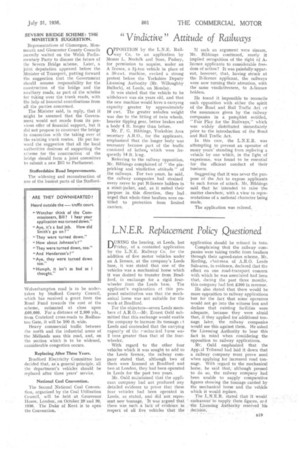"Vindictive" Attitude of Railways
Page 25

If you've noticed an error in this article please click here to report it so we can fix it.
OPPOSITION by the L.N.E. Railway Co. to an application by Messrs L. Norfolk and Sons, Pudsey, for permission to acquire, under an A licence, a 4-ton vehicle in place of a 20-cwt. machine, evoked a strong protest before the Yorkshire Deputy Licensing Authority (Mr. Willoughby Bullock), at LeedS, on Monday.
It was stated -that the vehicle to be Withdrawn was six years old, and that the new machine would have a carrying capacity greater by approximately 10 cwt. The greater unladen weight was due to the fitting of twin wheels, heavier tipping gear, better brakes and a body 4 ft. longer than before.
Mr. F. G. Bibbings, Yorkshire Area secretary A.R.O., for the applicants, emphasized that the, longer body was necessary because part of the traffic consisted of lathes‘ which were frequently 14 ft. lcng.
Referring to the railway opposition, Mr. Bibbings complained of " the pinpricking and vindictive attitude " of the railways. For two years, he said, the railway companies had strained every nerve to put B-licence holders in a strait-jacket, and, aC, it suited their purpose in this direction, they had urged.that whole-time hauliers were entitled to protection from limited carriers. If such an argument were sincere, Mr. Bibbings continued, surely it implied recognition of the right of Alicence applicants to considerable free • dom of action? It was painfully:apparent, however, that, having struck at the B-licence applicant, the railways were now turning their attention, with the same vindictiveness, to A-licence holders.
He found it impossible to reconcile such opposition with either the spirit of the Road and Rail Traffic Act cr the assurances given by the railway companies in a pamphlet entitled, "Fair Play for the Railways," which was widely distributed immediately prior to the introduction of the Road and Rail Traffic Act.
In this case, -the L.N.E.R. was attempting to prevent an operator of many years' standing from replacing a vehicle by one which, in the light of experience, was found to be essential for the efficient conduct of their business.
Suggesting that it was never the purl pOse Of .-the Act to expose applicants to such forms of attack, Mr. Bibbings said that he 'intended to raise the matter elsewhere,' with a view to representations of a national character being made.
The application was refused,












































































